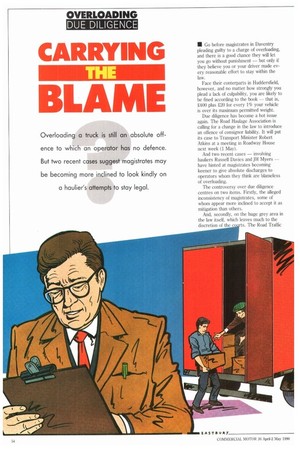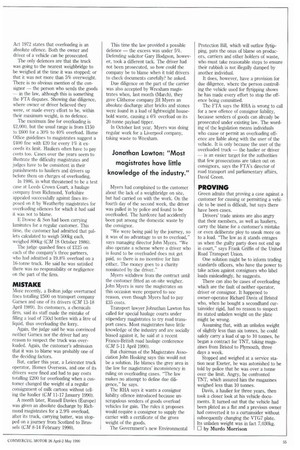CARRYING
Page 80

Page 81

If you've noticed an error in this article please click here to report it so we can fix it.
THE
BLAME
• Go before magistrates in Daventry pleading guilty to a charge of overloading, and there is a good chance they will let you go without punishment — but only if they believe you or your driver made every reasonable effort to stay within the law.
Face their conterparts in Huddersfield, however, and no matter how strongly you plead a lack of culpability, you are likely to be fined according to the book — that is, 2400 plus 220 for every 1% your vehicle is over its maximum permitted weight.
Due diligence has become a hot issue again. The Road Haulage Association is calling for a change in the law to introduce an offence of consignor liability. It will put its case to Transport Minister Robert Atkins at a meeting in Roadway House next week (1 May).
And two recent cases — involving hauliers Russell Davies and JH Myers — have hinted at magistrates becoming keener to give absolute discharges to operators whom they think are blameless of overloading.
The controversy over due diligence centres on two items. Firstly, the alleged inconsistency of magistrates, some of whom appear more inclined to accept it as mitigation than others.
And, secondly, on the huge grey area in the law itself, which leaves much to the discretion of the • ts. The Road Traffic Act 1972 states that overloading is an absolute offence. Both the owner and driver of a vehicle can be prosecuted.
The only defences are that the truck was going to the nearest weighbridge to be weighed at the time it was stopped; or that it was not more than 5% overweight. There is no obvious mention of the consignor — the person who sends the goods — in the law, although this is something the FTA disputes. Showing due diligence, where owner or driver believed they were, or made every effort to be, within their maximum weight, is no defence.
The maximum fine for overloading is £2,000, but the usual range is from £150 to £600 for a 30% to 40% overload. Home Office guidelines to magistrates suggest a £400 fine with £20 for every 1% it exceeds its limit. Hauliers often have to pay costs too. Cases over the years seem to illustrate the difficulty magistrates and judges have to be consistent in their punishments to hauliers and drivers up before them on charges of overloading.
In 1986, in what threatened to be a test case at Leeds Crown Court, a haulage company from Richmond, Yorkshire appealed successfully against fines imposed on it by Weatherby magistrates for overloading offences for which it had said it was not to blame.
E Dowse & Son had been carrying laminates for a regular customer. This time, the customer had admitted that pallets calculated to weigh 500kg each, weighed 800kg (CM 18 October 1986).
The judge quashed fines of £125 on each of the company's three partners, who had admitted a 19.8% overload on a 16-tonne truck. He said he was satisfied there was no responsibility or negligence on the part of the firm.
MISTAKE
More recently, a Bolton judge overturned fines totalling £500 on transport company Garnex and one of its drivers (CM 13-18 April 1989). Its customers, a chemicals firm, said its staff made the mistake of filling a load of 750c1 bottles with a litre of liquid, thus overloading the lorry.
Again, the judge said he was convinced neither Garnex nor the driver had any reason to suspect the truck was overloaded. Again, the customer's admission that it was to blame was probably one of the deciding factors.
But, earlier this year, a Leicester truck operator, Homes Overseas, and one of its drivers were fined and had to pay costs totalling £200 for overloading when a customer changed the weight of a regular consignment of milk cartons without telling the haulier (CM 11-17 January 1990).
A month later, Russell Davies (Europe) was given an absolute discharge by Richmond magistrates for a 2.9% overload, after its truck, carrying butter, was stopped on a journey from Scotland to Brussels (CM 8-14 February 1990).
This time the law provided a possible defence — the excess was under 5%. Defending solicitor Gary Hodgson, however, took a different tack. The driver had not been prosecuted, so how could the company be to blame when it told drivers to check documents carefully? he asked.
Due diligence on the part of the carrier was also accepted by Wrexham magistrates when, last month (March), they gave Clitheroe company JH Myers an absolute discharge after bricks and stones were found in a load of lightweight household waste, causing a 6% overload on its 20-tonne payload tipper.
In October last year, Myers was doing regular work for a Liverpool company, taking waste to Wrexham.
Myers had complained to the customer about the lack of a weighbridge on site, but had carried on with the work. On the fourth day of the second week, the driver was pulled in by police and found to be overloaded. The hardcore had accidently been put among the domestic waste by the consignor.
"We were being paid by the journey, so it was of no advantage to us to overload," says managing director John Myers. "We also operate a scheme where a driver who is found to be overloaded does not get paid, so there is no incentive for him either. The money goes to a charity nominated by the driver."
Myers withdrew from the contract until the customer fitted an on-site weigher. John Myers is sure the magistrates on this occasion were prepared to see reason, even though Myers had to pay £35 costs.
Transport lawyer Johnathan Lawton has called for special haulage courts under stipendary magistrates to try road transport cases. Most magistrates have little knowledge of the industry and are socially biased against it, he said at a recent Franco-British road haulage conference (CM 5-11 April 1990).
But chairman of the Magistrates Association John Hosking says this would not be a solution. He blames the grey area in the law for magistrates' inconsistency in ruling on overloading cases. "The law makes no attempt to define due diligence," he says.
The RHA says it wants a consignor liability offence introduced because unscrupulous senders of goods overload vehicles for gain. The rules it proposes would require a consignor to supply the carrier with a certificate of the gross weight of the goods.
The Government's new Environmental Protection Bill, which will outlaw flytipping, puts the onus of blame on producers, carriers and other holders of waste, who must take reasonable steps to ensure their rubbish is not illegally dumped by another individual.
It does, however, have a provision for due diligence, where the person controlling the vehicle used for flytipping shows he has made every effort to stop the offence being committed.
The ETA says the RHA is wrong to call for a new offence of consignor liability, because senders of goods can already be prosecuted under existing law. The wording of the legislation means individuals who cause or permit an overloading offence are liable along with the user of the vehicle. It is only because the user of the overloaded truck — the haulier or driver — is an easier target for the authorities that few prosecutions are taken out on consignors, says the FTA's director of road transport and parliamentary affairs, David Green.
PROVING
Green admits that proving a case against a customer for causing or permitting a vehicle to be used is difficult, but says there have been cases.
Drivers' trade unions are also angry that their members, as well as hauliers, carry the blame for a customer's mistake or even deliberate ploy to sneak more on to a load. "The law as it stands enrages us when the guilty party does not end up in court," says Frank Griffin of the United Road Transport Union.
One solution might be to inform trading standards officers, who have the power to take action against consignors who label loads misleadingly, he suggests.
There can also be cases of overloading which are the fault of neither operator, driver or consignor. It happened to owner-operator Richard Davis of Bristol who, when he bought a secondhand curtainsider rigid, had no reason to suspect its stated unladen weight on the plate might be wrong.
Assuming that, with an unladen weight of slightly less than six tonnes, he could safely carry a load of up to 10 tonnes, he began a contract for TNT, taking magazines from Bristol to Plymouth, three days a week.
Stopped and weighed at a service station near Exeter, he was astonished to be told by police that he was over a tonne over the limit. Angry, he confronted TNT, which assured him the magazines weighed less than 10 tonnes.
Davis, a haulier for three years, then took a closer look at his vehicle documents. It turned out that the vehicle had been plated as a flat and a previous owner had converted it to a curtainsider without subsequently changing the VTG7 plate. Its unladen weight was in fact 7,030kg.
by Murdo Morrison
























































































































